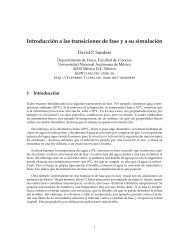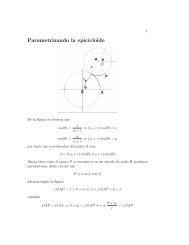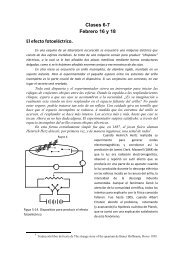"Surely You're Joking, Mr. Feynman!" - unam.
"Surely You're Joking, Mr. Feynman!" - unam.
"Surely You're Joking, Mr. Feynman!" - unam.
Create successful ePaper yourself
Turn your PDF publications into a flip-book with our unique Google optimized e-Paper software.
when the applicant is very, very good, we can accept him. He handed me an application<br />
and asked me to look it over.<br />
He comes back: "Well, what do you think?"<br />
"I think he's first rate, and I think we ought to accept him. I think we're lucky to<br />
get him here."<br />
"Yes, but did you look at his picture?"<br />
"What possible difference could that make?" I exclaimed.<br />
"Absolutely none, sir! Glad to hear you say that. I wanted to see what kind of a<br />
man we had for our new professor." Gibbs liked the way I came right back at him without<br />
thinking to myself, "He's the head of the department, and I'm new here, so I'd better be<br />
careful what I say." I haven't got the speed to think like that; my first reaction is immedi<br />
ate, and I say the first thing that comes into my mind.<br />
Then another guy came into my office. He wanted to talk to me about philosophy,<br />
and I can't really quite remember what he said, but he wanted me to join some kind of a<br />
club of professors. The club was some sort of antiSemitic club that thought the Nazis<br />
weren't so bad. He tried to explain to me how there were too many Jews doing this and<br />
that some crazy thing. So I waited until he got all finished, and said to him, "You<br />
know, you made a big mistake: I was brought up in a Jewish family." He went out, and<br />
that was the beginning of my loss of respect for some of the professors in the humanities,<br />
and other areas, at Cornell University.<br />
I was starting over, after my wife's death, and I wanted to meet some girls. In<br />
those days there was a lot of social dancing. So there were a lot of dances at Cornell,<br />
mixers to get people together, especially for the freshmen and others returning to school.<br />
I remember the first dance that I went to. I hadn't been dancing for three or four<br />
years while I was at Los Alamos; I hadn't even been in society. So I went to this dance<br />
and danced as best I could, which I thought was reasonably all right. You can usually tell<br />
somebody's dancing with you and they feel pretty good about it.<br />
As we danced I would talk with the girl a little bit; she would ask me some<br />
questions about myself, and I would ask some about her. But when I wanted to dance<br />
with a girl I had danced with before, I had to look for her. "Would you like to dance<br />
again?"<br />
"No, I'm sorry; I need some air." Or, "Well, I have to go to the ladies' room" <br />
this and that excuse, from two or three girls in a row! What was the matter with me? Was<br />
my dancing lousy? Was my personality lousy?<br />
I danced with another girl, and again came the usual questions: "Are you a<br />
student, or a graduate student?" (There were a lot of students who looked old then<br />
because they had been in the army.)<br />
"No, I'm a professor."<br />
"Oh? A professor of what?"<br />
"Theoretical physics."<br />
"I suppose you worked on the atomic bomb."<br />
"Yes, I was at Los Alamos during the war."<br />
She said, "<strong>You're</strong> a damn liar!" and walked off. That relieved me a great deal. It<br />
explained everything. I had been telling all the girls the simpleminded, stupid truth, and I<br />
never knew what the trouble was. It was perfectly obvious that I was being shunned by<br />
one girl after another when I did everything perfectly nice and natural and was polite, and









